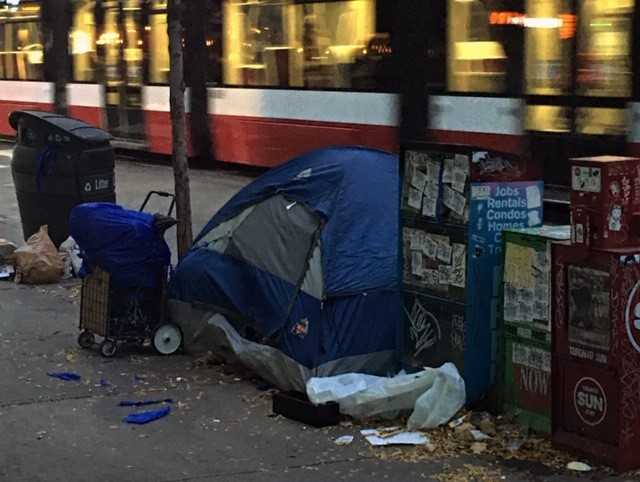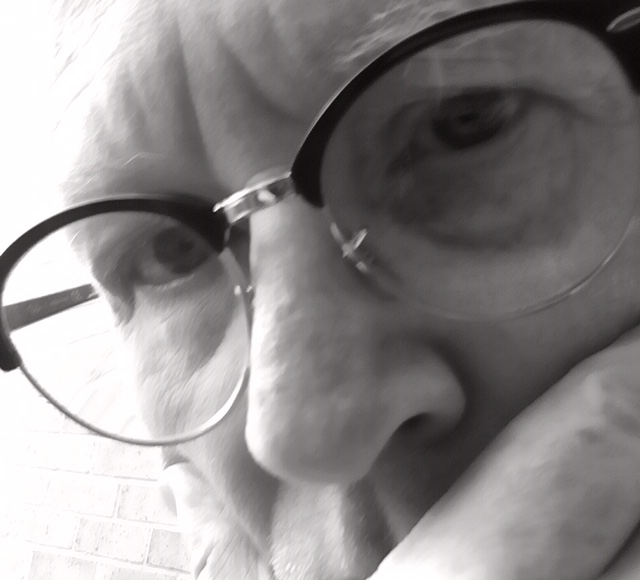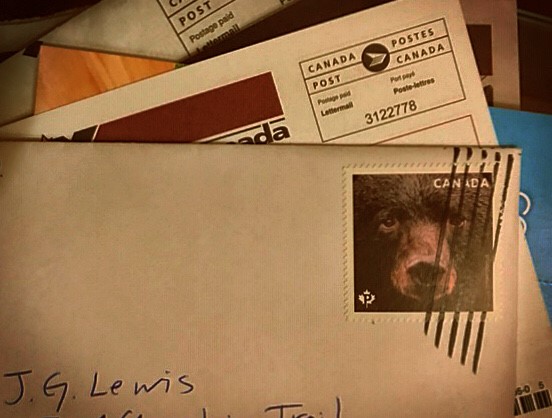Last Friday, caught up in afternoon foot traffic and not paying attention, I walked by.
I had heard the banter on the morning show, earlier in the week, but, right then it did not register.
It wasn’t until I went back for early morning coffee on Sunday that it hit me.
There was a tent pitched next to the curb, nestled between the newspaper boxes and a trash bin, on one of the city’s busy downtown streets.
Yes, I am aware of the plight of the homeless, and fully aware there are people living on the streets of this city beneath sleeping bags, blankets and cardboard, but this seemed so… so, permanent.
This is what it has come to.
This is how we live, at the close of a decade, in Toronto.
Now I’ve seen, in the past, small tent cities under the Gardiner Expressway. I know people have chosen to camp out in out-of-the-way ravines, out of sight and out of mind of most city dwellers, but this is right out there, for everybody to see.
I sat inside Starbucks, warm on the chilly morning, enjoying a cup of expensive coffee, and a slice of coffee cake. It was early; pigeons had only begun settling on the sidewalk and slowly people walked by the tent, not really paying attention to what is going on.
Maybe we have become immune to the difficulties, and the pain, more and more people are experiencing each day in a city that has become increasingly less affordable?
We all seem to have come to accept people living on the street as normal.
We have become accustomed to homelessness.
We walk by on the way to the office, or shopping, or on our way home to our cozy condos. We don’t acknowledge that this is all that some people have: a temporary slice of dirty cold concrete with little to protect them from the elements.
Daily, as we walk the streets, we are approached by panhandlers, or some just sit and wait for coins to be dropped into their cups.
Mostly we walk on by.
I consider myself a charitable person; yet, rarely do I drop any change into the cups or open palms. I’m more inclined, now and then, to step into any of the three Salvation Army missions within the circumference of my common area and make a donation. Maybe this takes away some of my guilt, or maybe I just know the money will go towards a wholly meaningful charity and not end up wasted on the wasted. Drugs and addicts are a common sight in the city. There is a safe injection site I walk by more frequently than the missions. I, more often than a few times, have stepped by, or over, discarded needles on the street.
I do see the homeless, but the tent on Queen Street hit me hard.
Of all the streets of Toronto, Queen Street West is overly familiar to me. In 2015 – as I was getting to know my new home city – I spent much of a year photographing the sights, the people and places, at all times of the day, for a photo essay I was preparing.
Yes, that year, I did come to know two regulars who slept, essentially, on the same corners (one of them is still there today), but I had never seen a tent on the street.
The chatter on the radio last week, from both the morning show host — who rides his bike to work very early every morning — and some longtime Toronto residents also indicated they had never seem this before.
I was stunned.
The scene has affected me, and I don’t know what to do about it.
We’ve just come out of a federal election where the word “affordable” was bandied about, but none of the parties offered any sort of platform to deal with social housing, even improvements or support to the shelter system. Hell, it’s hard to name an issue any of the parties actually introduced a platform on at all.
And this is Ontario, where the ruthlessly ignorant Dog Ford government will surely continue to cut funding to social services and support to those who need it the most. The waiting list for affordable housing continues to grow, along with the demand.
With about 7,000 shelter beds in Toronto, there is still not enough capacity to deal with this problem.
Now, I don’t have the solution, not do I know what it’s like to camp out on a city street during the colder weather certain to come, but I know it’s not right.
I know it’s not how I want to live. I don’t think anybody does.
Still we walk on by.
“The measure of a society is found in how they
treat their weakest and most helpless citizens.”
-Jimmy Carter




